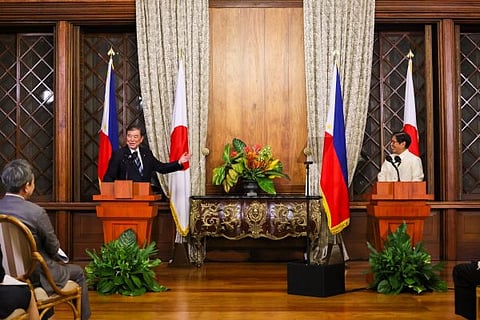
- NEWS
- the EDIT
- COMMENTARY
- BUSINESS
- LIFE
- SHOW
- ACTION
- GLOBAL GOALS
- SNAPS
- DYARYO TIRADA
- MORE

Japanese Prime Minister Shigeru Ishiba concluded a two-day official visit to the Philippines on Tuesday, reinforcing bilateral defense and security cooperation amid rising tensions in the East and South China Seas.
Following a summit with President Ferdinand R. Marcos Jr., both leaders committed to deepening military collaboration to uphold regional stability and a free, rules-based Indo-Pacific. Ishiba emphasized the importance of unity between Tokyo and Manila in pushing back against coercive tactics and attempts to unilaterally alter the status quo in contested maritime regions.
“I hope that our two nations can continuously communicate with each other to oppose attempts to change the status quo in the East and South China Seas by force or coercion,” Ishiba said in a joint statement with Marcos at Malacañang Palace. The visit comes amid China’s aggressive maneuvers in waters overlapping with the Philippines’ exclusive economic zone and Japan’s territorial dispute with China over the Senkaku Islands.
The two countries, both treaty allies of the United States, have ramped up defense cooperation in recent years.
In July 2024, Japan and the Philippines signed a Reciprocal Access Agreement (RAA), which enables both forces to conduct joint exercises and training on each other’s soil. Japan’s Ministry of Foreign Affairs (MoFA) hopes the agreement will be ratified by the Japanese Diet before its session concludes in June.
Speaking to reporters on Wednesday, MoFA spokesperson Toshihiro Kitamura said ratifying the RAA would be a “good step forward” in advancing bilateral security ties. “We have submitted the agreement to the Diet and expect discussions to begin very soon,” he said.
Both leaders also launched talks on an Acquisition and Cross-Servicing Agreement (ACSA), which would facilitate logistical cooperation such as refueling during joint drills. Kitamura noted that the ACSA is a technical arrangement to streamline operations, while discussions are also underway on a potential intelligence-sharing pact.
Marcos welcomed the growing strategic partnership with Japan, stating, “Our discussions today have laid the groundwork for a resonant and inspiring future across many sectors.”
In addition to military agreements, the leaders committed to enhancing maritime safety through joint training, base development, and trilateral efforts with the United States.
Ishiba’s visit precedes the 70th anniversary of the normalization of diplomatic ties between Japan and the Philippines, marking a new chapter in their long-standing alliance.
